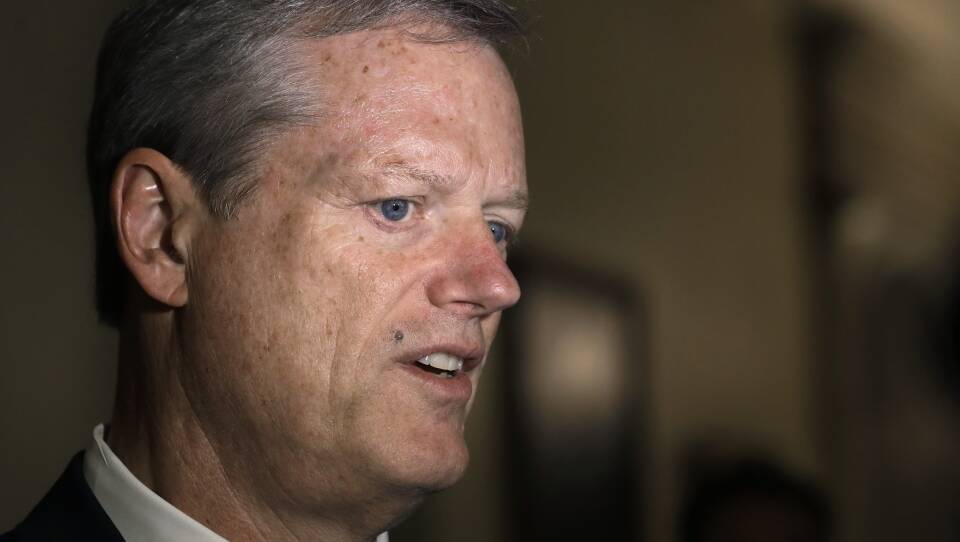Gov. Charlie Baker defended his handling of the Holyoke Soldiers’ Home tragedy on Boston Public Radio Thursday, rejecting criticism from hosts Margery Eagan and Jim Braude that he shirked personal responsibility in the response to the COVID-19 outbreak that killed more than 70 veterans living at the home.
In contrast to a report commissioned by the Baker administration, a Boston Globe Spotlight report places Baker and top health secretary Marylou Sudders closer to the management issues at the home, led by Bennett Walsh, and overseen by former Secretary of Veterans Affairs Francisco Ureña.
Neither Walsh nor Ureña inhabit their former posts: Walsh was fired and Ureña resigned over their roles in the outbreak, which led to one of the highest death tolls at any senior-care center in the country.
Eagan characterized Ureña as the “fall guy” over the Holyoke Soldiers’ Home tragedy, based on the Spotlight investigation that found inconsistencies in the report commissioned by the Baker administration.
Baker denied Eagan’s characterization and instead defended the report commissioned by his administration (known as the Pearlstein report), the state legislature’s report and the attorney general’s own investigation.
“They all say the same thing, which is there was nowhere near enough supervision of Bennett Walsh,” he said. “They also say that the organizational structure this thing operates under needs to change.”
Braude referred to the Pearlstein report as “thoroughly incomplete,” questioning whether Sudders’ role was downplayed and Ureña’s role was exaggerated.
Baker again pushed back against that characterization, and upheld the Pearlstein report as consistent with the legislature’s and “overwhelmingly adopted with basically everyone else,” rejecting the Globe’s investigation.
During the interview, Baker also defended his proposal to extend the Massachusetts tax-free holiday from the standard two-day weekend to the full months of August and September, citing a nearly $3.4 billion budget surplus.
The proposal would put an estimated $900 million back in residents’ pockets.
“The people of Massachusetts and the businesses in Massachusetts created far more revenue than anybody thought we were going to create,” said Baker, “I think we should give back a piece of that to them, particularly after we make a very significant deposit to our stabilization fund.”
Critics of Baker’s proposal say the benefits of the extended tax-free holiday would not provide as much relief to small businesses as it would to large retailers, who have not faced the same financial duress during the COVID-19 pandemic. Eagan asked if Baker would consider restricting the tax exemptions to businesses with 30 employees or fewer — a suggestion made by an earlier caller.
“Well, that’s an interesting idea,” Baker responded, adding he would be “perfectly happy to talk to the legislature about that.”
Others say Baker should use any excess money to deal with those still struggling to recover from the pandemic, like in housing or employment programs.
Baker also discussed Massachusetts’ COVID-19 vaccination status. After a rocky rollout, has been a national leader in vaccination rates, and just passed 4.1 million vaccinations.
“I happen to believe we built a really terrific mixed-model approach to vaccinating people,” said Baker, acknowledging there are limits to reaching the vaccine hesitant.
Baker said full FDA authorization for the vaccines might be what “moves the needle” for those hesitant to get the vaccine, and may move the needle for his own willingness to mandate vaccines in some capacity.
Pfizer and Moderna have both applied for full FDA authorization; at the moment, vaccines are being distributed on emergency use authorization.
“I can’t tell you how many people have said to me, ‘I’m not going to do this until this is something other than an emergency use authorization, I want to see the federal government say this is permanent,’” said Baker. “I would rather talk about [mandating vaccines] at that point. I think it’s a hard sell.”







